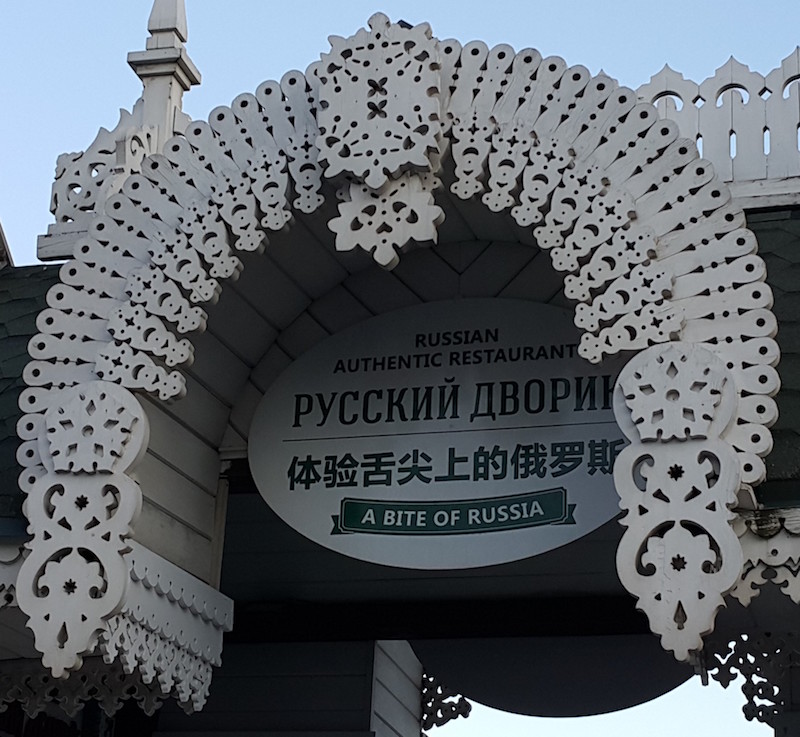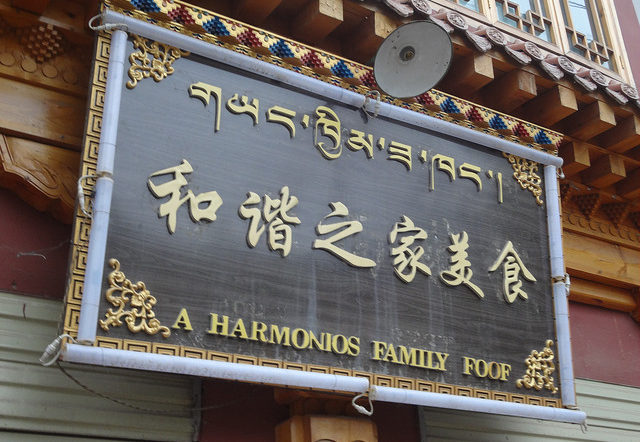Archive for Multilingualism
October 9, 2017 @ 7:07 am· Filed by Victor Mair under Language acquisition, Language teaching and learning, Multilingualism, Onomatopoeia, Pedagogy
The following post is from an old, now defunct, blog, but the description of little Eunice learning three languages at once (none of which was her natal tongue spoken at home) and other discussions of Chinese are unusual in their detail and sensitivity, so worthy of sharing with Language Log readers:
"Primary learning in a multilingual society ", Grammar Gang (5/24/14)
The author of the post is Jyh Wee Sew (Centre for Language Studies, Faculty of Arts & Social Sciences, National University of Singapore). I will simply quote a few passages of the post and make a few concluding remarks, but warmly recommend that anyone who is interested in second (and third) language pedagogy / acquisition read the whole post.
Read the rest of this entry »
Permalink
September 16, 2017 @ 5:38 am· Filed by Victor Mair under Borrowing, Morphology, Multilingualism
In "Impromptu biscriptalism on a Starbucks cup" (9/8/17), we encountered a Starbucks cup from Shenyang, northeast China that had the following handwritten notation on the side: wài's 外's ("foreigner's"). I referred to the "'s" as impromptu because I thought that it was essentially a one-off phenomenon. Nonetheless, I considered the "'s" to be linguistically significant in two major ways: 1. evidence of biscriptalism; 2. incorporation of an English morpheme in Chinese.
Read the rest of this entry »
Permalink
September 14, 2017 @ 10:25 pm· Filed by Victor Mair under Found in translation, Language and advertising, Language and food, Multilingualism
From Nikita Kuzmin:

Read the rest of this entry »
Permalink
September 6, 2017 @ 5:00 pm· Filed by Victor Mair under Language and politics, Lost in translation, Multilingualism
Political poster in Sydney, Australia:

Read the rest of this entry »
Permalink
September 3, 2017 @ 10:09 pm· Filed by Victor Mair under Lost in translation, Multilingualism
Sign on a Sino-Tibetan restaurant:

(Source)
Read the rest of this entry »
Permalink
July 1, 2017 @ 9:51 am· Filed by Victor Mair under Multilingualism, Topolects, World language, Writing, Writing systems
Twenty years ago today, on July 1, 1997, control of Hong Kong, formerly crown colony of the British Empire, was handed over to the People's Republic of China. The last few days has seen much celebration of this anniversary on the part of the CCP, with visits by Xi Jinping and China's first aircraft carrier, as well as a show of force by the People's Liberation Army, but a great deal of anguish on the part of the people of Hong Kong:
"Once a Model City, Hong Kong Is in Trouble" (NYT [6/29/17])
"Xi Delivers Tough Speech on Hong Kong, as Protests Mark Handover Anniversary" (NYT [7/1/17])
"China's Xi talks tough on Hong Kong as tens of thousands call for democracy" (Reuters [7/1/17])
"China 'humiliating' the UK by scrapping Hong Kong handover deal, say activists: Pro-democracy leaders say Britain has ‘legal, moral and political responsibility’ to stand up to Beijing" (Guardian [7/1//17])
"Tough shore leave rules for Chinese navy personnel during Liaoning’s Hong Kong visit: The crew from China’s first aircraft carrier will be prohibited from enjoying Western-style leisure activities during city handover anniversary visit" (SCMP [6/28/17])
All of this political maneuvering has an impact on attitudes toward language usage in Hong Kong.
Read the rest of this entry »
Permalink
May 29, 2017 @ 11:18 am· Filed by Victor Mair under Language and biology, Language and food, Multilingualism, Signs, Translation
About a week ago I received this Facebook query from Scaruffi.com about Chinese chatbot poetry (relayed by Mark Liberman):
Since friday Chinese social media are flooded with comments about a poetry book written by Microsoft's chatbot Xiaoice that was published on May 19 (three days ago).
I cannot find a single reference to this book in Google's search engine.
No western media seems to have picked up the news.
(As of today, monday the 22nd)
Read the rest of this entry »
Permalink
May 28, 2017 @ 8:40 pm· Filed by Victor Mair under Language and biology, Language and food, Multilingualism, Signs, Translation
Photograph of a sign at Sequim Bay, Washington taken by Stephen Hart:

Read the rest of this entry »
Permalink
April 24, 2017 @ 6:07 pm· Filed by Victor Mair under Bilingualism, Diglossia and digraphia, Multilingualism, Writing systems
Christopher Alderton saw this flyer on his way to work a few days ago:

Read the rest of this entry »
Permalink
April 7, 2017 @ 8:36 am· Filed by Victor Mair under Multilingualism, Sociolinguistics
At several stations on the commute from Swarthmore to University City station, around half of the people who get on the train are Indians. Usually they are happily conversing with each other in one or another South Asian language.
Today the train was packed, and I was sitting on the aisle seat next to four Indian men who were talking to each other in Tamil. I asked them, "When you meet other Indians, how do you know which language to speak to them?"
Read the rest of this entry »
Permalink
March 17, 2017 @ 9:50 pm· Filed by Victor Mair under Multilingualism, Signs
"The Jewish Ghosts of Palermo", a post on The Dangerously Truthful Diary of a Sicilian Housewife, shows this photograph near the beginning:

Caption: Possibly the most important Jewish street in Palermo, the Via dei Cartari was
where all the Jewish scribes drew up any contract needed by the citizens of Palermo.
Read the rest of this entry »
Permalink
March 8, 2017 @ 11:35 am· Filed by Victor Mair under Language and politics, Multilingualism, Signs, Slogans, Translation
There are multilingual signs all over Swarthmore (where I live) that say "Hate Has No Home Here". The signs are printed in six languages: English, Urdu, Hebrew, Korean, Arabic, and Spanish. I wondered about the choice of languages, but — with a little googling — I found that these are apparently the languages most commonly spoken at Petersen Elementary School in the North Park neighborhood of Chicago, where the campaign to post these signs originated. It's interesting that the linguistic mix of an elementary school in Chicago determined the multilingualism of signs that are being posted all over the country.
Incidentally, there is also a #LoveThyNeighbor (No Exceptions) campaign going on, and here I wondered about the archaism of the "Thy". It seems to me that the King Jamesian language of these signs conveys clear Christian overtones, which may account for the fact that there are far fewer of these signs around than the HHNHH signs.
"Hate" is also a hot topic in China these days.
Read the rest of this entry »
Permalink
March 4, 2017 @ 9:41 pm· Filed by Victor Mair under Language acquisition, Language teaching and learning, Multilingualism, Second language, Writing systems
People often ask me questions like these:
What's the easiest / hardest language you ever learned?
Isn't Chinese really difficult?
Which is harder, Chinese or Japanese? Sanskrit or German?
Without a moment's hesitation, I always reply that Mandarin is the easiest spoken language I have learned and that Chinese is the most difficult written language I have learned. I learned to speak Mandarin fluently within about a year, but I've been studying written Chinese for half a century and it's still an enormous challenge. I'm sure that I'll never master it even if I live to be as old as Zhou Youguang.
Read the rest of this entry »
Permalink





